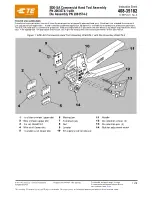
BESSEY
®
Forged Vise Instructions
Operating Instructions
Please read and save these instructions. Read through these instructions carefully before using the product.
Protect yourself and others by observing all safety information, warnings, and cautions. Failure to comply with
instructions could result in personal injury and/or damage to product or property. Please retain instructions for
future reference.
Forged Steel Combination Pipe & Bench Vise
Designed for holding materials for repair, assembly, dismantling,
welding and other holding applications.
Swivel base & locking T Nuts are included in the box and should be
assembled as illustrated in the image.
Securely attach the assembled vise to a work surface using industrial
fasteners with lock washers (not included). Periodically check that
mounting fasteners are tight.
Specifications and Dimensions
Model
Jaw
Width
Jaw
Max. Opening
Pipe
Capacity
Weight
BV-DF8SB
8”
10 1/2
”
1/4
” – 6”
67.3 Lbs.
BV-DF6SB
6”
7”
1/4
” – 5”
50.0 Lbs.
BV-DF5SB
5”
6 1/2
”
1/4
” – 3”
25.2 Lbs.
BV-DF4SB
4”
4 1/4
”
1/4
” – 3”
14.0 Lbs.
General Safety Information
Misuse of bench vises can cause serious injury to hands, eyes and other body parts.
Never use a hammer, extension pipe or cheater bar on the handle of the vise or the locking T-nuts on the
swivel base. Never weld the vise or base to a work surface.
Never unscrew the moveable jaw beyond the maximum specified opening of the vise.
Always use the correct size vise to fit the work being done.
Always wear eye protection or face shield when using power tools or striking tools on a work piece held in a
vise.
Assembly
Remove swivel base, T-Locking nuts, and steel locking bar from box and attach to stationary jaw of the vise.
Installation
Mount vise to work surface using appropriately sized industrial bolts, lock washers & nuts, tighten securely.
Stationary jaw face should be positioned slightly beyond the edge of the work surface to allow holding long
work pieces.




















